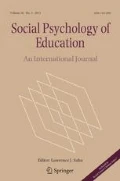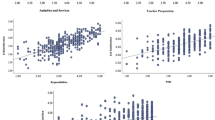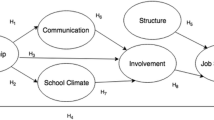Abstract
The relationship with students is one of the main sources of teachers’ job satisfaction throughout their career. To support veteran teachers and decrease attrition rates during the late career, more insights are necessary to understand the complex relationship between veteran teachers’ relationships with their students and their job satisfaction. In the current study, we have developed a typology of veteran teachers based on both student perceptions and teacher perceptions of teachers’ interpersonal relationships with their students and teachers’ self-reported job satisfaction. Four groups of teachers were identified: positive over-estimators and positive under-estimators refer to teachers with relatively high job satisfaction and negative under-estimators and negative realists included teachers who are relatively dissatisfied with their teaching job. Satisfied veteran teachers seem to attach importance to the quality of the teacher-student relationship, whereas unsatisfied veteran teachers also attribute their dissatisfaction to extrinsic and school-based factors such as work conditions and governmental policies. We also found differences in the extent to which veteran teachers had realistic perceptions of their relationships with students. Two types of veteran teachers, positive under-estimators and negative under-estimators, underestimated their relationships with students, whereas one type of satisfied veteran teachers overestimated this relationship (positive over-estimators). Just one type of teachers generally showed realistic self-perceptions of their relationships with students, but these teachers were generally quite dissatisfied (negative realists). Implications for supporting veteran teachers are discussed.
Similar content being viewed by others
References
Asendorpf, J. B., Conner, M., De Fruyt, F., De Houwer, J., Denissen, J. J. A., Fiedler, K., et al. (2013). Recommendations for increasing replicability in psychology. European Journal of Personality, 27, 108–119.
Ben-Perez, M., & McCulloch, G. (2009). International perspectives on veteran teachers: Introduction. Teachers and Teaching: Theory into Practice, 15, 403–408.
Betoret, F. D. (2006). Stressors, self-efficacy, coping resources and burnout among secondary school teachers in Spain. Educational Psychology, 26, 519–539.
Bobbitt, S. A., Faupel, E., & Burns, S. (1991). Characteristics of stayers, movers, and leavers: Results from the teacher follow-up survey, 1988–89. Issue brief. Washington, DC: National Center for Education Statistics.
Borman, G. D., & Dowling, N. M. (2008). Teacher attrition and retention: A meta-analytic and narrative review of the research. Review of Educational Research, 78, 367–409.
Brekelmans, J. M. G., Mainhard, T., den Brok, P., & Wubbels, Th. (2011). Teacher control and affiliation: Do students and teachers agree? Journal of Classroom Interaction, 46(1), 17–26.
Brekelmans, M., Wubbels, T., & van Tartwijk, J. (2005). Teacher-student relationships across the teaching career. International Journal of Educational Research, 43, 55–71.
Brookhart, S., & Freeman, D. (1992). Characteristics of entering teacher candidates. Review of Educational Research, 62, 37–60.
Calinski, R. B., & Harabasz, J. (1974). A dendrite method for cluster analysis. Communications in Statistics, 3, 1–27.
Cano-García, F., Padilla-Muñoz, E., & Carrasco-Ortiz, M. (2005). Personality and contextual variables in teacher burnout. Personality and Individual Differences, 38, 929–940.
Caprara, G. V., Barbaranelli, C., Borgogni, L., & Steca, P. (2003). Efficacy beliefs as determinants of teachers’ job satisfaction. Journal of Educational Psychology, 95, 821–832.
Caprara, G. V., Barbaranelli, C., Steca, P., & Malone, P. S. (2006). Teachers’ self-efficacy beliefs as determinants of job satisfaction and students’ academic achievement: A study at the school level. Journal of School Psychology, 44, 473–490.
Chang, M. (2009). An appraisal perspective of teacher burnout: Examining the emotional work of teachers. Educational Psychology Review, 21, 193–218.
Day, C., & Gu, Q. (2009). Veteran teachers: Commitment, resilience and quality retention. Teachers and Teaching: Theory and Practice, 15, 442–457.
Day, C., & Gu, Q. (2010). The new lives of teachers. London: Routledge.
Day, C., Stobart, G., Sammons, P., Kington, A., Qing, G., Smees, R., et al. (2006). Variations in teachers’ work, lives and effectiveness (No. RR743): Department for Education and Skills.
Dinham, S., & Scott, C. (1998). A three domain model of teacher and school executive career satisfaction. Journal of Educational Administration, 36, 362–378.
Dorman, J. (2003). Relationship between school and classroom environment and teacher burnout: A LISREL analysis. Social Psychology of Education, 6, 107–127.
Festinger, L. (1957). A theory of cognitive dissonance. Stanford, CA: Stanford University Press.
Friedman, I. A. (2003). Self-efficacy and burnout in teaching: The importance of interpersonal-relations efficacy. Social Psychology of Education, 6, 191–215.
Gavish, B., & Friedman, I. (2010). Novice teachers’ experience of teaching: A dynamic aspect of burnout. Social Psychology of Education, 13, 141–167.
Grant, L. W. (2006). Persistence and self-efficacy: A key to understanding teacher turnover. The Delta Kappa Gamma Bulletin, 72(2), 50–54.
Grayson, J. L., & Alvarez, H. K. (2008). School climate factors relating to teacher burnout: A mediator model. Teaching and Teacher Education, 24, 1349–1363.
Greenglass, E. R., & Burke, R. J. (2003). Teacher stress. In M. F. Dollard, A. H. Winefield, & H. T. WineField (Eds.), Occupational stress in the service professions (pp. 213–236). New York: Taylor and Francis.
Guarino, C. M., Santibañez, L., & Daley, G. A. (2006). Teacher recruitment and retention: A review of the recent empirical literature. Review of Educational Research, 76, 173–208.
Hancock, C. B., & Scherff, L. (2010). Who will stay and who will leave? Predicting secondary English teacher attrition risk. Journal of Teacher Education, 61, 328–338.
Hargreaves, A. (2005). Educational change takes ages: Life, career and generational factors in teachers’ emotional responses to educational change. Teaching and Teacher Education, 21, 967–998.
Harris, D. N., & Adams, S. J. (2007). Understanding the level and causes of teacher turnover: A comparison with other professions. Economics of Education Review, 26, 325–337.
Horowitz, L. M., & Strack, S. (Eds.). (2010). Handbook of interpersonal theory: Theory, research, assessment and therapeutic interventions. Hoboken, NJ: Wiley.
Ingersoll, R. M., & May, H. (2012). The magnitude, destinations, and determinants of mathematics and science teacher turnover. Educational Evaluation & Policy Analysis, 34, 435–464.
Klassen, M. (2010). Effects on teaches’ self-efficacy and job satisfaction: Teacher gender, years of experience, and job stress. Journal of Educational Psychology, 102, 741–756.
Klassen, R. M., & Chui, M. (2010). Effects on teachers’ self-efficacy and job satisfaction: Teacher gender, years of experience, and job stress. Journal of Educational Psychology, 102, 741–756.
Kyriacou, C. (2001). Teacher stress: Directions for future research. Educational Review, 53, 27–35.
Locke, E. A. (1976). The nature and causes of job satisfaction. In M. D. Dunnette (Ed.), Handbook of industrial and organizational psychology (pp. 1297–1349). Chicago: Rand McNally.
Mainhard, T. (2015). Liking a tough teacher—Interpersonal characteristics of teaching and students’ achievement goals. School Psychology International, 36, 559–574.
Moses, I., Berry, A., Saab, N., & Admiraal, W. (2017). Who wants to become a teacher? Typology of student-teachers’ commitment to teaching. Journal of Education for Teaching, 43, 444–457.
Nagar, K. (2012). Organizational commitment and job satisfaction among teacher during times of burnout. Vikalpa: The Journal for Decision Makers, 37(2), 43–60.
Nunnally, J. C. (1978). Psychometric theory (2nd ed.). New York: McGraw-Hill.
OECD. (2005). Teachers matter: Attracting, developing and retaining effective teacher. Paris: OECD Publishing.
OECD. (2016). Education at Glance 2016: OECD Indicators. Paris: OECD Publishing.
Perrachione, B. A., Rosser, V. J., & Petersen, G. J. (2008). Why do they stay? Elementary teachers’ perceptions of job satisfaction and retention. Professional Educator, 32(2), 25–41.
Scott, C., Stone, B., & Dinham, S. (2001). “I love teaching but…” International pattersn of teacher discontent. Education Policy Analysis Archives, 9, 1–18.
Skaalvik, E., & Skaalvik, S. (2011). Teachers’ feeling of belonging, exhaustion, and job satisfaction: The role of school goal structure and value consonance. Anxiety Stress and Coping, 24, 369–385.
Skaalvik, E. M., & Skaalvik, S. (2009). Does school context matter? Relations with teacher burnout and job satisfaction. Teaching and Teacher Education, 25, 518–524.
Skaalvik, E. M., & Skaalvik, S. (2017). Still motivated to teach? A study of school context variables, stress and job satisfaction among teachers in senior high school. Social Psychology of Education, 20, 15–37.
Spilt, J. M., Koomen, H. M. Y., & Thijs, J. T. (2011). Teacher wellbeing: The importance of teacher-student relationships. Educational Psychology Review, 2, 457–477.
Struyven, K., Jacobs, K., & Dochy, F. (2013). Why do they want to teach? The multiple reasons of different groups of students for undertaking teacher education. European Journal of Psychology of Education, 28, 1007–1022.
Tschannen-Moran, M., & Woolfolk Hoy, A. W. (2001). Teacher efficacy: Capturing an elusive construct. Teaching and Teacher Education, 17, 783–805.
Tschannen-Moran, M., & Woolfolk Hoy, A. W. (2007). The differential antecedents of self-efficacy beliefs of novice and experienced teachers. Teaching and Teacher Education, 23, 944–956.
van der Ploeg, J. D., & Scholte, E. M. (2003). Arbeidssatisfactieindex: Handleiding voor leerkrachten in het basis- en voorgezet onderwijs. [Job satisfaction: manual for teachers primary and secondary education]. Houten/Antwerpen, the Netherlands/Belgium: BohnStafleu Van Loghum.
Van Droogenbroeck, F., Spruyt, B., & Vanroelen, C. (2014). Burnout among senior teachers: Investigating the role of workload and interpersonal relationships at work. Teaching and Teacher Education, 43, 99–109.
Van Maele, D., & Van Houtte, M. (2012). The role of teacher and faculty trust in forming teachers’ job satisfaction: Do years of experience make a difference? Teaching and Teacher Education, 28, 879–889.
Veldman, I., Admiraal, W., Mainhard, T., Wubbels, Th., & van Tartwijk, J. (2017). Measuring teachers’ interpersonal self-efficacy: Relationship with realized interpersonal aspirations, classroom management efficacy and age. Social Psychology of Education, 20, 411–426.
Veldman, I., Admiraal, W., van Tartwijk, J., Mainhard, T., & Wubbels, Th. (2016). Veteran teachers’ job satisfaction as a function of personal demands and resources in the relationships with their students. Teachers and Teaching Theory into Practice, 22, 913–926.
Veldman, I., van Tartwijk, J., Brekelmans, M., & Wubbels, T. (2013). Job satisfaction and teacher-student relationships across the teaching career. Four case studies. Teaching and Teacher Education, 32, 55–65.
Vieluf, S., Kunter, M., & Van de Vijver, F. J. R. (2013). Teacher self-efficacy in cross-national perspective. Teaching & Teacher Education, 35, 92–103.
Wubbels, Th., Brekelmans, M., den Brok, P., Levy, J., Mainhard, T., & van Tartwijk, J. (2012). Let’s make things better: Developments in research on interpersonal relationships in education. In T. Wubbels, P. den Brok, J. van Tartwijk, & J. Levy (Eds.), Interpersonal relationships in education (pp. 225–250). Rotterdam: Sense Publishers.
Wubbels, Th., Brekelmans, M., den Brok, P., & van Tartwijk, J. (2006). An interpersonal perspective on classroom management in secondary classrooms in the Netherlands. In C. Evertson & C. Weinstein (Eds.), Handbook of classroom management: Research, practice, and contemporary issues (pp. 1161–1191). Mahwah, NJ: Lawrence Erlbaum Associates.
Wubbels, Th., Brekelmans, M., & Hooymayers, H. (1992). Do teacher ideals distort the self-reports of their interpersonal behavior? Teaching and Teacher Education, 8, 47–58.
Zee, M., & Koomen, H. M. Y. (2016). Teacher self-efficacy and its effects on classroom processes, student academic adjustment, and teacher well-being: A syntheses of 40 years of research. Review of Educational Research, 86, 981–1015.
Author information
Authors and Affiliations
Corresponding author
Ethics declarations
Conflict of interest
The authors have no conflicts of interest to declare.
Rights and permissions
About this article
Cite this article
Admiraal, W., Veldman, I., Mainhard, T. et al. A typology of veteran teachers’ job satisfaction: their relationships with their students and the nature of their work. Soc Psychol Educ 22, 337–355 (2019). https://doi.org/10.1007/s11218-018-09477-z
Received:
Accepted:
Published:
Issue Date:
DOI: https://doi.org/10.1007/s11218-018-09477-z




